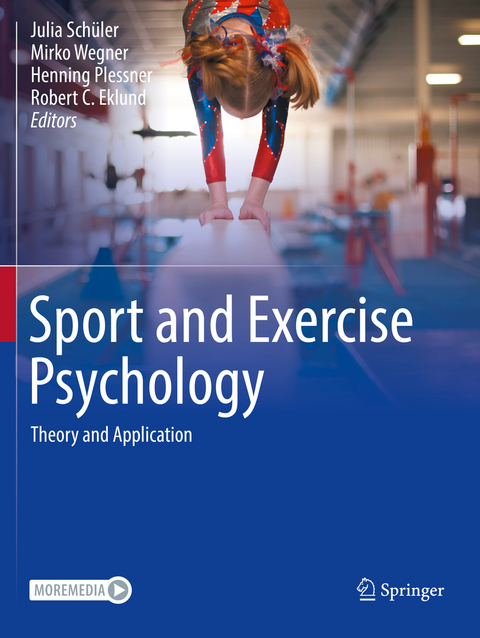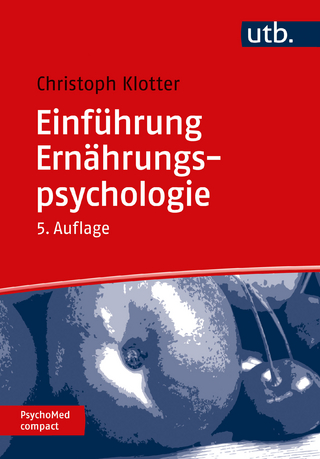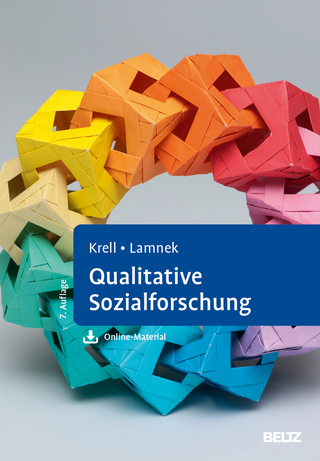
Sport and Exercise Psychology
Springer International Publishing (Verlag)
978-3-031-03923-2 (ISBN)
This textbook covers topics in sport and exercise psychology for students of psychology and sport science, as well as for sport practitioners who want to understand topics in sport psychology in more detail and depth.
The book is divided into two main parts: Theory and Application. The first part covers the theoretical facets of sport and exercise psychology, and the close link between theory and practice, divided into the sub-disciplines of psychology (cognition, motivation, emotion, personality and development, and social processes). The second part focuses on the applications of sport and exercise psychology in the context of performance and health.
With contributions from scholars across the globe, the book offers an international and timely perspective on the key fundaments of sport psychology. Taken together, these chapters provide a challenging yet accessible overview of the larger field of sport and exercise psychology.
This book issuitable for readers at different levels of competence, supported with didactic elements (learning objectives and learning control questions) to find the right learning level.
Julia Schüler is Professor of Sport Psychology at the University of Konstanz (Constance, Germany). Her research and teaching focuses is on motivational and volitional processes that explain and predict health- and performance-oriented sports. For her, among the most interesting phenomena are intrinsic motivation, motive conflicts, self-control, as well as the relationship between sport and stress.
Mirko Wegner is a Professor of Health Science at the University of Hamburg (Hamburg, Germany). His research focuses on processes of motivation and self-regulation in the context of performance, school, and health sports as well as the experiential and behavioral consequences of physical activity. He is particularly interested in unconscious behavioral and experiential processes in the context of sport and movement and their psychophysiological correlates.
Henning Plessner is Professor of Sport Psychology at the University of Heidelberg (Heidelberg, Germany). His research focuses on judgements and decisions in sport, the social psychology of sport, and the psychology of intuition. He is particularly interested in the advantages and disadvantages of the processes underlying spontaneous and deliberate behavior.
Robert C. Eklund is the Mode L. Stone Distinguished Professor of Sport Psychology, and Associate Dean for Faculty Development and Advancement at Florida State University (Tallahassee Florida USA). His primary research focus is on athlete motivation and experiential states (i.e., Flow, Burnout) but he has also published extensively on self-perceptions, self-beliefs, and self-presentation in sport as well as the return to athletic competition following serious injury.
Chapter 1: Introduction: Sport and Exercise Psychology - Theory and Application.- Part 1: Cognition.- Chapter 2: Perception and Attention.- Chapter 3: Learning and memory in sport.- Chapter 4: Neurocognition and movement.- Chapter 5: Judgment and decision making.- Chapter 6: Embodied Cognition.- Chapter 7: Motivation and goals in the context of sport and movement.- Chapter 8: Intrinsic Motivation in the Context of Sport.- Chapter 9: Implicit Motives in Sport and Exercise.- Chapter 10: Volition in Sport and Exercise.- Part 2: Emotions.- Chapter 11: Emotions in Sport.- Chapter 12: Anxiety in Sport.- Chapter 13: Person, Situation, and Person-Situation Interaction in Sports.- Chapter 14: Personality development through sport.- Chapter 15: Physical activity across the lifespan - Personality, physical activity and sedentary behavior.- Chapter 16: Group Performance.- Chapter 17: Social influence of spectators.- Chapter 18: Interaction and Communication.- Chapter 19: The Self in Sport andExercise.- Chapter 20: Self-regulation in competitive sports.- Chapter 21: Cognitive training in sports.- Chapter 22: Applying group dynamics to enhance sport teams.- Chapter 23: Talent Identification and Development in Sport.- Chapter 24: Sleep, Recovery and Rest.- Chapter 25: Models to explain and change health behavior and physical activity.- Chapter 26: Physical Activity, Subjective Well-being and Mental Health.- Chapter 27: Sport, Stress and Health.- Chapter 28: Exercise, Health Disorders and Injuries.
| Erscheinungsdatum | 11.03.2024 |
|---|---|
| Zusatzinfo | XV, 757 p. 233 illus., 145 illus. in color. |
| Verlagsort | Cham |
| Sprache | englisch |
| Maße | 210 x 279 mm |
| Themenwelt | Geisteswissenschaften ► Psychologie ► Sozialpsychologie |
| Medizin / Pharmazie ► Medizinische Fachgebiete ► Psychiatrie / Psychotherapie | |
| Weitere Fachgebiete ► Sportwissenschaft | |
| Schlagworte | applied sport psychology • cognition and exercise • cognition and sport • emotion and exercise • emotion and sport • Exercise and health • high performance sport • motivation and exercise • motivation and sport • performance psychology • sport and health • Sport Psychology • sport psychology practice |
| ISBN-10 | 3-031-03923-8 / 3031039238 |
| ISBN-13 | 978-3-031-03923-2 / 9783031039232 |
| Zustand | Neuware |
| Haben Sie eine Frage zum Produkt? |
aus dem Bereich


